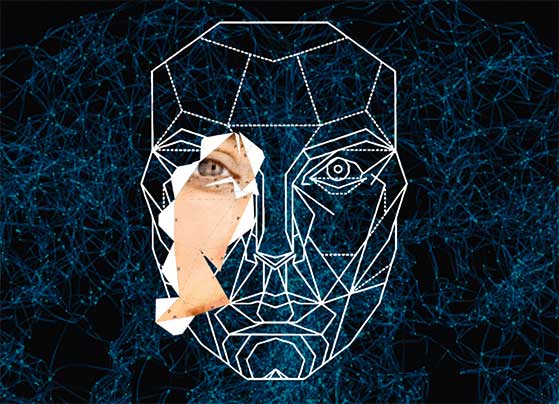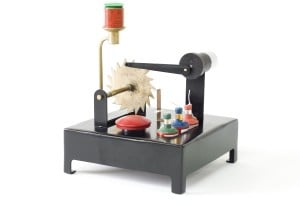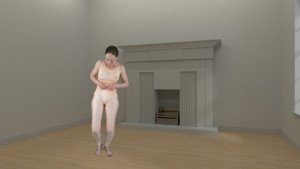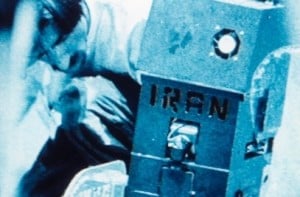TSOTA interviews Andy Abbott, curator of Bradford’s Notes from Technotopia exhibition
October 28, 2015
 TSOTA’s Rich Jevons talks to curator Andy Abbott about the current exhibition at the University of Bradford’s Gallery II, Notes from Technotopia: Artistic visions of the tech-past/present/future.
TSOTA’s Rich Jevons talks to curator Andy Abbott about the current exhibition at the University of Bradford’s Gallery II, Notes from Technotopia: Artistic visions of the tech-past/present/future.
For people who don’t know you, Gallery II and Black Dogs could you give us a bit of background?
The exhibition came about from my new role as Producer Music and Visual Arts at the University of Bradford. Following my doctoral research at Leeds Uni in 2011 – a practice-led PhD focusing on socially-engaged art – I started here as Fellow in Music on a part time basis. Through that role I’ve been organising music events and festivals like Bradford Threadfest and Recon which have aimed to commission new work and collaborations between artists of different disciplines and backgrounds. Since January this year I’ve been programming the visual arts strand of Arts on Campus and this is the first exhibition I’ve curated at Gallery II.
The art collective I’ve been part of since 2003, Black Dogs, is also involved and have helped to produce an accompanying publication. We also have a programme of events working with other partners and venues including the 1 in 12 Club, Delius Arts And Cultural Centre, Fuse Art Space, The Free Association and Recon. I like the idea of expanding what an exhibition can be.
So the show looks at the future related through past and current technology?
It’s about the way that visual artists relate to technology, both the technology that is around them and technology that might be obsolete or out-dated. But also how artists can think imaginatively into future scenarios which technology plays a significant role in. So really how artists and researchers look at the past, present and future through the lens of technology.
There is urgency around that question because of how quickly technology is developing and how much of a change it is making between different generations. For example, there is the use of artificial intelligence which could be a huge evolutionary step for mankind. So it’s an exciting time to look at these things in a sideward manner that disrupts the linear progress.
You mention obsolescence – which is built into capitalism so we buy more stuff – are the artists presenting an alternative to that?
Yes, in a way. Raquel Meyers makes animation using a Commodore 64 which is no longer consumer technology but she is continuing to use and appreciating that machine. I guess it’s similar to how artists continue to use printing presses and screen-printing and keeping those old traditions and techniques alive. So in a way there is a sustainability issue there.
So is the vision for the future one of dystopia or utopia, or both like Ursula le Guin’s The Dispossessed?
 I suppose there’s no one without the other. I think there is optimism and scepticism in all of the elements of the exhibition – there are bits that are funny and bits that are very serious. The Frozen Music Collective show part of their project called Souls as Software Objects which is about human and machine-consciousness. Martin Smith has these funny, pointless but incredibly well made kinetic sculptures, one of which pulls party poppers. Rudiment are a tech company based on University campus who develop software and research for human rights causes and they show the development of artificial intelligence that identifies artillery craters. It’s partly about flipping things on their head and disrupting the idea of linear progress we might have around the development of technology and society.
I suppose there’s no one without the other. I think there is optimism and scepticism in all of the elements of the exhibition – there are bits that are funny and bits that are very serious. The Frozen Music Collective show part of their project called Souls as Software Objects which is about human and machine-consciousness. Martin Smith has these funny, pointless but incredibly well made kinetic sculptures, one of which pulls party poppers. Rudiment are a tech company based on University campus who develop software and research for human rights causes and they show the development of artificial intelligence that identifies artillery craters. It’s partly about flipping things on their head and disrupting the idea of linear progress we might have around the development of technology and society.
 You have always been interested in the politics of labour haven’t you?
You have always been interested in the politics of labour haven’t you?
Yes, a lot of my own work has been about that, as well as my research. In this exhibition there’s a piece by Shona Macnaughton called When Slaves Love One Another It’s Not Love which is a reworking of The Maids by Jean Genet. An underlying theme of the exhibition is how new technologies will effect work, the economy and politics. My past take on that has sided much more with groups like the Luddites and Situationists International and other people who have offered critiques of work. Those groups proposed that the automation of work quite often makes people more easily exploited rather than freeing them and giving us more time. So the exhibition and the publication and events put the effects of technology into a much wider context.
 And can you tell us a bit about the robot football?
And can you tell us a bit about the robot football?
Ha, yeah, that’s the film RoboCup 99 by Mika Taanila which is a short documentary about an annual competition where various engineers come together to create robots which play football. Their aim is that by the mid 21st Century these robots would be able to be World Cup football winners.
What appeals to you about sci-fi as a genre?
I wouldn’t want people coming thinking it’s a science fiction exhibition but it uses the idea of thinking into the future. We’re inviting Nick Srncek to talk about his new book ‘Inventing the Future: Postcapitalism and a World Without Work’ and that will be accompanied by live music from the band F.A.L.C.O who feature in The Free Association’s contribution to the exhibition.
Giles Bailey’s work is based on a book that he is writing called ‘The Last Day of the Railway Lands’ set in an alternate present. He performed a reading at the opening. I saw Moon Kyungwon and Jeon Joonho’s work at Documenta 13. Their work is called News from Nowhere after William Morris’ utopian socialist novel, and includes huge scale video installation and masses of research. We’re showing the book that came out of that project in which they worked with people from different disciplines about the role of art in society of the future.
What would you like people to take from the show?
I think there is a lot for people to think about and to gain a more enlightened and playful take on technology and the part that it will play in our futures. Of course, I’d like people to come away feeling empowered and recognising their agency in being part of social change. So it’s kind of a critical pause to reflect on the way things are, the way they could be, and what our role in that is.
Notes from Technotopia: Artistic visions of the tech-past/present/future runs from 16th October to 10th December at Gallery II, University of Bradford. Opening hours Monday – Friday: 11am – 5pm (Thursdays until 6pm). The exhibition is accompanied by a programme of off-site events partnering with venues and organisations in Bradford and beyond. For details and tickets see www.brad.ac.uk/gallery.



Comments